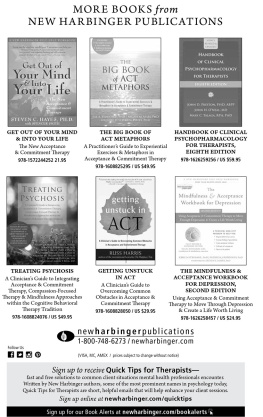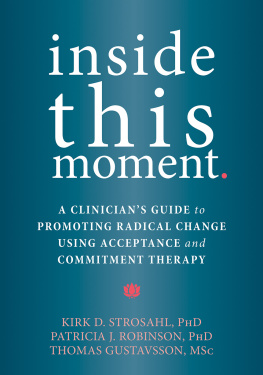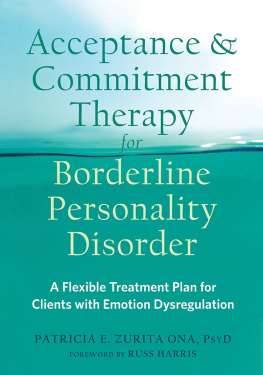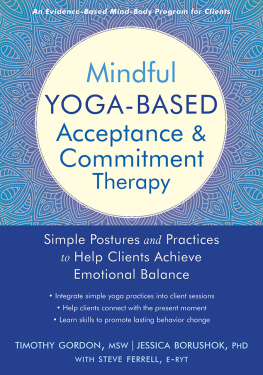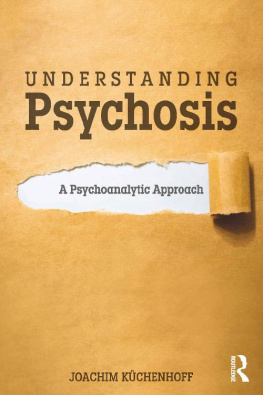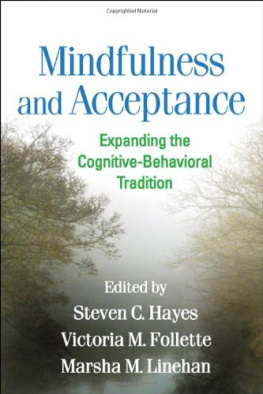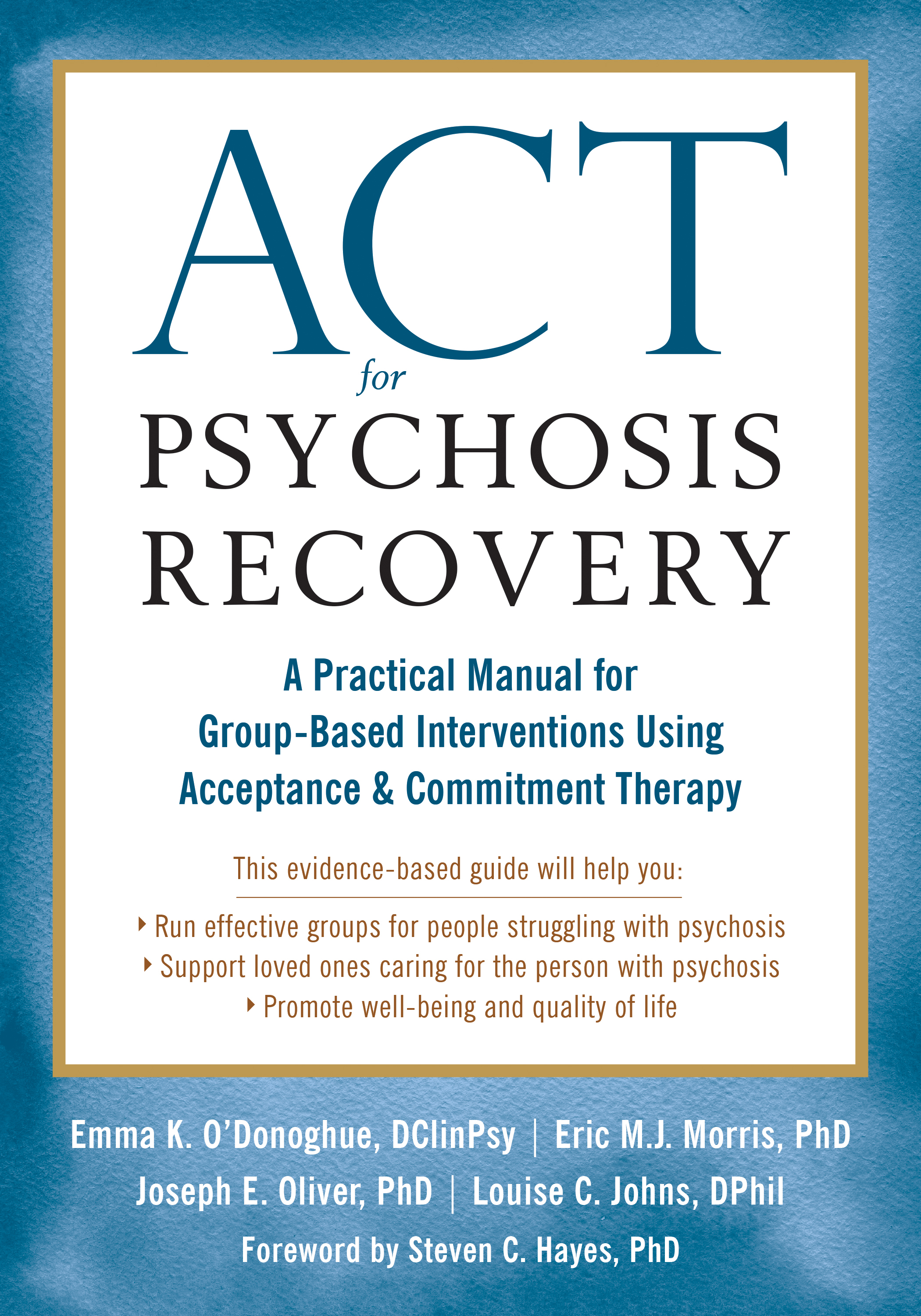Packed with useful tools, techniques, strategies, and guidelines, this well-written book is a gold mine for the effective treatment of psychosis. Step-by-step, it will help you to develop all the skills you need to work with the many challenges of this specialized field. If you do acceptance and commitment therapy (ACT), and you work with psychotic clients, then you cant afford to go without this book!
Russ Harris , author of The Happiness Trap and ACT Made Simple
ACT for Psychosis Recovery is a fantastic resource for anyone wishing to offer ACT groups for people experiencing psychosis, or for their caregivers. It is written by leading experts in the field, and includes a thorough overview of theory and evidence. The inclusion of a chapter on peer-support co-facilitation is welcome and is in keeping with the values base of the approach. The group manual itself is very comprehensive, covering each session in detail and including a number of prompt sheets. These will help practitioners put the manual into practice with confidence.
Clara Strauss, DPhil, DClinPsych , consultant clinical psychologist and clinical research fellow and research lead at Sussex Mindfulness Centre, University of Sussex, and Sussex Partnership NHS Foundation Trust
This book is an absolute must for any mental health clinician who wants to provide state-of-the-art, evidence-based care to clients suffering from psychotic experiences, whether it be on the inpatient ward, or in an outpatient community setting. The manual is supported by numerous worksheets, detailed instructions for conducting core ACT metaphors in session, and helpful hints for addressing common issues. The authors demonstrate an unrivaled depth of knowledge of, and compassion for, those whose lives are affected by psychosis. That alone would make this book a key addition to any mental health clinicians library!
Kirk Strosahl PhD , cofounder of ACT, and coauthor of The Mindfulness and Acceptance Workbook for Depression
As a direct result of my participation in ACT, and practicing the essential taught tools, ACT for psychosis recovery disrupted my revolving door, long sessions in locked psychiatric hospitals, and led to my learning how to productively identify constructive approaches and manage challenges to ensure my enjoyment daily, of a quality of life with my mental health diagnoses, that had been denied to me before this therapy. Prior to ACT, my psychosis was indeed so pronounced, aggressive, and bleak, that I also spent time in prison. ACT for psychosis recovery was my final attempt at therapy.
Yvonne Patricia Stewart-Williams , artist, and author of Still On The Cusp Of Madness
Compiled by experts in the field, this is a comprehensive and invaluable resource for supporting recovery in the context of psychosis. Written in an engaging and accessible way, the importance of close collaboration with experienced experts is highlighted throughout. The authors are to be commended for developing an approach that richly recognizes the common humanity shared by those who have experienced psychosis, and those who are committed to helping.
Ross G. White, PhD, DClinPsy , associate professor of clinical psychology at the University of Liverpool
As evidence of the benefits of ACT for psychosis are piling up, there is a need for a clear and practical manual on how to implement ACT for psychosis in the clinical workplace. This book is offering exactly that, an extensive and detailed manual of a four-session ACT group intervention for people suffering from psychosis at different stages of illness, as well as their caregivers. With additional information on training, supervision, and inclusion of peer-support co-facilitators, this book is a must-read for all clinicians interested in third-wave psychotherapies for people with psychosis.
Inez Myin-Germeys , professor of psychiatry, and head of the Center for Contextual Psychiatry at KU Leuven in Belgium
ACT has enriched the family of cognitive behavioral therapies immeasurably. This book distills over ten years of the authors work developing ACT for and with people struggling with psychosis . ACT for Psychosis Recovery provides detailed guidance on how to run groups for people with psychosis, and their caregivers. In the spirit of generosity associated with ACT, the book includes all the worksheets, metaphors, and measures needed to run these groups in clinical practice.
Katherine Newman-Taylor , consultant clinical psychologist at Southern Health NHS Foundation Trust, and associate professor at the University of Southampton
ACT for Psychosis Recovery is a unique resource for practitioners from any background. Developed by expert clinicians who are also leading researchers, the manual shows how to engage participants in simple and powerful group exercises that foster hope and enable action today toward living a more satisfying life. The use of a central metaphor and straightforward language accommodates all abilities, and innovations in peer facilitation and caregiver groups open new directions. When implementing it in our services, the degree of change in participants surprised even our group leaders. The authors are onto something special here!
John Farhall, PhD , associate professor of clinical psychology at La Trobe University, and consultant clinical psychologist at NorthWestern Mental Health in Melbourne, Australia
Publishers Note
This publication is designed to provide accurate and authoritative information in regard to the subject matter covered. It is sold with the understanding that the publisher is not engaged in rendering psychological, financial, legal, or other professional services. If expert assistance or counseling is needed, the services of a competent professional should be sought.
Distributed in Canada by Raincoast Books
Copyright 2018 by Emma K. ODonoghue, Eric M.J. Morris, Joseph E. Oliver,
and Louise C. Johns
Context Press
An imprint of New Harbinger Publications, Inc.
5674 Shattuck Avenue
Oakland, CA 94609
Cover design by Amy Shoup
Acquired by Catharine Meyers
Edited by James Lainsbury
Indexed by James Minkin
All Rights Reserved
Library of Congress Cataloging-in-Publication Data on file
Emma ODonoghue
To my darling Johnny and my amazing family and friends. I love you dearly.
Joe Oliver
To my wife, Shalyn, with much love.
Eric Morris
To my parents, Nev and Bev. I am, as ever, grateful for your love and support.
Louise Johns
Per Andrea. Grazie per il tuo impegno.
Contents
Foreword
ACT for Psychosis: It Is Time
W hen people trot out statistics on the cost of mental health problems, they often fail to note that psychosis produces a large share of those costs. Im not talking just about dollars and cents. People struggling with psychosis die at a far younger age; they are commonly in poverty; they are frequently victims of violent crime; and they have dramatically poorer overall physical health.
Meanwhile, the mental health establishment has been all too willing to accept that anti-psychotic medications are full and ready solutions to these problems, with psychosocial interventions playing only a minor and supportive role. As providers, family members, and recipients of care all increasingly realize: this approach is not working. All anti-psychotic medications have serious side effects that grow with time and dose. Some of these include metabolic problems and cardiovascular disease, which contribute to the health problems and lowered life expectancy I just noted. Because the use of anti-psychotic medications prematurely settled into a status of accepted community practice before the data were fully in, many of the needed studies on long-term effects were never done, leading to a serious hole in our knowledge base that we have yet to fill adequately. Existing medications do have a role in the care of psychotic patients, but it is more limited than current practice suggests. Medication as a form of intervention needs to be combined with evidence-based psychosocial methods.

